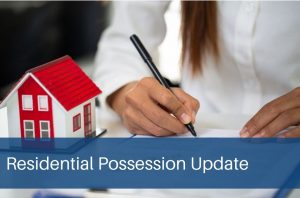More Challenges for Residential Landlords – New Notice Periods
- From 2nd September 2020, the minimum notice period for a Section 21 Notice seeking possession has increased to six months.
- There is a new Form 6A Section 21 Notice that landlords must use from 2nd September 2020
- Notice periods for Section 8 Notice on rent grounds have also increased (see below).
What’s New?
Before Coronavirus it was open to residential landlords to regain possession of their property by serving a two-month Section 21 Notice on their tenants. It wasn’t always easy, it wasn’t perfect: it couldn’t be served until the fixed term of the tenancy had expired, and there were many requirements the landlord had to comply with for it to be a valid notice, such as EPCs, Gas Certificates, Deposit Protection, and How to Rent booklets. If tenants did not leave, the landlord then had to pay a court fee and go to court to get a possession order, then pay more court fees and finally get a warrant of possession to have the tenant evicted. The process from start to finish tended to take around 5-6 months, depending on how well the courts were resourced.
Many landlords used this process if the tenant was not paying the rent. It did not get them a court judgment for the rent arrears and in my experience, the tenant would rarely pay the landlord’s legal costs, but at least it eventually got possession of their property so they could re-let and start to receive rent again, or sell.
Since Coronavirus the Section 21 process is still available but is increasingly prolonged. First, the notice period was extended to three months and court possession proceedings were put on hold. Since 2nd September 2020, it has increased to six months. If notice were served now, it would not expire until March 2021. If the landlord immediately issued possession proceedings and then had to obtain a warrant of possession, it could take until at least July 2021 for them to gain possession, and possibly longer because court backlogs are likely.
For landlords that had already served a Section 21 Notice, they are now prevented from progressing any possession claim until 21st September 2020.
Of course, there are clear public policy reasons for the extension to 6 months; tenants may have lost jobs or had reduced incomes and need time to recover from that or to find alternative accommodation they can afford. Increased homelessness does not assist with social distancing and public health. However, where does that leave landlords? What other options are available to them? The government guidance urges landlords not to seek possession, but what other help is out there?
Options
The government has encouraged landlords and tenants to come to an agreement if the tenant cannot pay full rent. This still applies and tenants are being encouraged to pay what they can, and they should be paying off the rent they missed when they can. There will be many sympathetic landlords who are engaging with this, but however sympathetic, some will struggle to afford it or maybe desperate to gain possession so they can sell their property to help with their own finances. In the meantime, landlords will still have to find money to cover all their usual repairing obligations. Landlords should be sure to properly document any agreements varying the rent payments. We can assist with that.
If there are rent arrears, landlords have another option, which is to serve a Section 8 Notice on grounds of rent arrears. However, this process may prove no better. A Section 8 Notice on that ground used to be two weeks. For rent arrears under six months, it is now a six -month notice. For rent arrears of more than six months the notice is only 4 weeks’, but of course there have to be serious 6-month arrears before the 4-week notice can be relied upon, which means if the tenant stays until an eviction date, the overall arrears by the time possession is obtained are likely to be at least 10 months either way. Presumably, if a 4 -week notice is served and the tenant then brings the arrears to just below 6 months, that notice can no longer be relied on to seek possession, so it may be better to get the 6-month notice served now while the arrears are under 6 months.
There is no government help for landlords struggling because their tenants are not paying rent, but if the landlord is paying a mortgage, there has been an extension to the window for new applications for payment holidays until 31st October 2020. However, payment holidays are not automatic, and landlords will still have to make the missed repayments over the course of the mortgage, so monthly repayments will eventually increase.
The outlook is currently bleak if your tenant is not paying the rent, whether that is COVID-19 related or otherwise (the reason for non-payment makes no difference). Taking advice can help you to run through your options and the likely timescales, and at least decide on a strategy which is the lesser of the various evils. Contact Sarah today by emailing [email protected]







